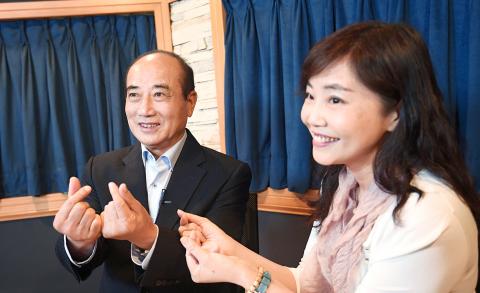Chinese Nationalist Party (KMT) Legislator Wang Jin-pyng (王金平) yesterday said he still plans to run for president, adding that he would neither quit the KMT nor run as vice president.
Wang made the remarks during an interview with UFO Radio talk show host Yin Nai-jing (尹乃菁).
When asked whether he would support Hon Hai Precision Industry Co chairman Terry Gou (郭台銘) in the KMT’s presidential primary, Wang said: “I will run [for president] to the end, although it is difficult to explain how I will do that.”

Photo: Liu Hsin-de, Taipei Times
His plan is to continue interacting with society and networking, he said, adding that all the support and resources he has gathered would be used to help the party in next year’s election.
When asked for more details about how he would run for president after forgoing the KMT primary, Wang said there are still five months until candidates need to register for the election.
“Who knows what will happen before then,” he said.
He needs to prepare himself in case the party needs his help further down the road, he said, adding that he would not leave the KMT.
Asked if he would consider running as a vice president, he said he would not.
However, Wang said he would support Gou if he won the primary, but had no comment on whether he would be willing to run as his vice president.
Gou has asked him questions related to that issue, he said, adding that the Hon Hai boss has met with him three times and could visit again.
Chou Hsi-wei (周錫瑋), a former commissioner of what was Taipei county at the time and another KMT hopeful, also met with him last week, Wang said, adding that he welcomes anyone who wants to exchange opinions.
Asked about Kaohsiung Mayor Han Kuo-yu’s (韓國瑜) visit yesterday to the Legislative Yuan, Wang said that Han’s main interest was controlling dengue fever in Kaohsiung.
He advised Han to apply for a second reserve fund from the Executive Yuan to cover disease-control measures, Wang said, adding that they did not speak about election issues.
Asked whether he felt Han did not repay him for helping organize rallies in Kaohsiung before the mayoral election last year, Wang said that people should not dwell on how much they have helped others, but rather focus on how much others have done for them.
“It would of course be best if [Han] could secure Kaohsiung, because that would help the KMT win the presidential election,” Wang said
With Han running for president, there is of course some uncertainty, he added.
As Han has already entered the primary, he should work to deliver policy results and ensure stability in Kaohsiung, so that city residents could better deal with his possible departure, Wang said.

A preclearance service to facilitate entry for people traveling to select airports in Japan would be available from Thursday next week to Feb. 25 at Taiwan Taoyuan International Airport, Taoyuan International Airport Corp (TIAC) said on Tuesday. The service was first made available to Taiwanese travelers throughout the winter vacation of 2024 and during the Lunar New Year holiday. In addition to flights to the Japanese cities of Hakodate, Asahikawa, Akita, Sendai, Niigata, Okayama, Takamatsu, Kumamoto and Kagoshima, the service would be available to travelers to Kobe and Oita. The service can be accessed by passengers of 15 flight routes operated by

Alain Robert, known as the "French Spider-Man," praised Alex Honnold as exceptionally well-prepared after the US climber completed a free solo ascent of Taipei 101 yesterday. Robert said Honnold's ascent of the 508m-tall skyscraper in just more than one-and-a-half hours without using safety ropes or equipment was a remarkable achievement. "This is my life," he said in an interview conducted in French, adding that he liked the feeling of being "on the edge of danger." The 63-year-old Frenchman climbed Taipei 101 using ropes in December 2004, taking about four hours to reach the top. On a one-to-10 scale of difficulty, Robert said Taipei 101

Taiwanese and US defense groups are collaborating to introduce deployable, semi-autonomous manufacturing systems for drones and components in a boost to the nation’s supply chain resilience. Taiwan’s G-Tech Optroelectronics Corp subsidiary GTOC and the US’ Aerkomm Inc on Friday announced an agreement with fellow US-based Firestorm Lab to adopt the latter’s xCell, a technology featuring 3D printers fitted in 6.1m container units. The systems enable aerial platforms and parts to be produced in high volumes from dispersed nodes capable of rapid redeployment, to minimize the risk of enemy strikes and to meet field requirements, they said. Firestorm chief technology officer Ian Muceus said

MORE FALL: An investigation into one of Xi’s key cronies, part of a broader ‘anti-corruption’ drive, indicates that he might have a deep distrust in the military, an expert said China’s latest military purge underscores systemic risks in its shift from collective leadership to sole rule under Chinese President Xi Jinping (習近平), and could disrupt its chain of command and military capabilities, a national security official said yesterday. If decisionmaking within the Chinese Communist Party has become “irrational” under one-man rule, the Taiwan Strait and the regional situation must be approached with extreme caution, given unforeseen risks, they added. The anonymous official made the remarks as China’s Central Military Commission Vice Chairman Zhang Youxia (張又俠) and Joint Staff Department Chief of Staff Liu Zhenli (劉振立) were reportedly being investigated for suspected “serious